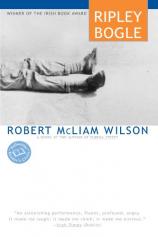Reading Group Guide
Discussion Questions
Ripley Bogle

1. On Dierdre's abortion (p. 313-14), the author has been quoted as saying, "I also wanted to illustrate something about the character in the sense that he was a complete mother****er, totally selfish, which is the other gift that young manhood brings to you, is that you can't see the consequences. " How does this statement reflect on Bogle's eventual fate? Does tragedy often result from the mistakes we make when we're just too young to know better?
2. Even though people who live in major cities see them every day, few of us know the life of a homeless person. Bogle makes an argument that the homeless know more about the city than do people with homes: "I know these places as a tramp. As a watcher. That's what trampdom gives you--audience status; the observer's, the artist's overview. We tramps, we watch you all--and listen too." (p. 19) Do you think this is true, or is Bogle an exception because of his intellect? Does the idea that the homeless are more aware of their surroundings than most people make you uncomfortable? Curious?
3. This book has several meditations on disease and the decay of Ripley Bogle's body. ("Cancer fascinates me. I have a true admiration for Cancer. It scares the shit out of me but I respect it." p. 133-34) Do you find his attitudes to be defenses against his fear? An acceptance of fate beyond his control? Despair? Use examples to support your claims Also, how did this make you feel about your own body? Were you more aware or afraid of the possibilities of disease after reading these passages?
4. Some of Bogle's observations are crude or cutting or disturbing. Some are very funny. Find a passage that made you laugh out load. Why is it funny to you? 5. Consider yourself, the reader, in relation to Ripley Bogle. Who are you to him? His confidant? Friend? Judge? Witness? What is this book to him? How does his awareness of the reader, and of the book itself as a construction, influence our perceptions of him? Of his intelligence? ("Yes indeed, we are most certainly near the end. We're running out of paper space--O tyrannous covers!" p. 318)
5. Bogle is a huge liar throughout, admittedly. When he confesses his deceit, does he explain his insecurities and shame in a way that's more revealing, and interesting, than if he had told his story truthfully? Can a liar be charming in this way? Why? When do you trust him, and when do you think he's lying? Is he more trustworthy when he's evaluating others than when he's describing himself?
6. Bogle alternates between hating his physical appearance and being amazingly vain. From his own account, he was an extremely attractive young man before he became destitute. Is he just trying to be amusing, constantly referring to his beauty? Does he just enjoy the absurdity of being a vain tramp or is being handsome really a vital part of his self-esteem? Could the self-loathing itself be a part of his vanity?
7. Ripley's language is one of the most shocking things about him. Sometimes his sentences are rich and multilayered, filled with five-syllable words that fine-tune each of his thoughts and opinions. Some of his words are vulgar and cutting. Besides his intelligence, what does his inner voice reveal to you? Would meeting him face-to-face be at all similar to the kind of intimacy that reading this inner monologue delivers?
8. In a very simple analysis, Ripley Bogle is the story of a very intelligent man who, because of certain circumstances and his own self-destructiveness, has ended up in a horrific situation. Does his intellect comfort him or did it doom him? In the end, after everything is revealed, how did you feel about him? Did you like him as he wanted you to?
9. Has reading this book changed any of your beliefs about London or Belfast?
10. Do you agree or disagree with the assessment of satire in the following passage: The satirist must be aware of the folly and vices of that which is satirised but must avoid moral superiority or hypocrisy. Satire has a function: the censure of folly and evil and the stimulation of reform. It should be corrective not vindictive. It is a deflating weapon which should be employed upon only that which is mundane. Is this true? Is this the whole story? I think not. We are all victims of satire. We suffer under wit, sarcasm, irony and ridicule. Cynicism, invective and the sardonic plague our doings--We make a tasty meal for Mockery. (p. 144)
Ripley Bogle
- Publication Date: February 29, 2000
- Paperback: 352 pages
- Publisher: Ballantine Books
- ISBN-10: 0345430948
- ISBN-13: 9780345430946






